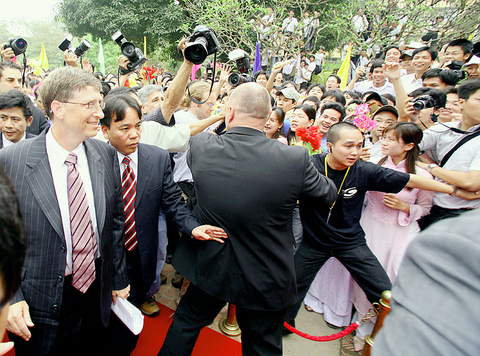Microsoft chairman Bill Gates received a rock-star's welcome at a Vietnamese university yesterday, with thousands of students crushing forward to get a glimpse of the world's richest man.
Fresh from dining at his US home with Chinese President Hu Jintao (
He later spoke at the Hanoi University of Technology and presented 10 scholarships for Microsoft's official training center in Hanoi.

PHOTO: AFP
Gates praised the potential of Vietnam's fledgling high-tech sector, saying he was pleased to hear that Microsoft's primary computer chip maker, Intel Corp, is building a US$320 million chip assembling plant in Ho Chi Minh City.
"I have no doubt that other IT manufacturers will see the kind of skills and the economic favor in coming to this market," Gates said.
"Vietnam should also be working on the software development side, the outsourcing side," he said.
The fervor that greeted Gates, 50, in Vietnam -- at least one student was crushed in the melee and had to be carried away -- reflects the fast-growing but still-impoverished communist country's eagerness to follow the example of India and China and move into higher-wage technology jobs.
"I've idolized Mr. Bill Gates for a long time now, and I longed for a chance to meet and see him in person," said Nguyen Duy Hung, 20, a computer sciences student at Hanoi National University. "My dream is to start my own software company like him."
However, Hung said that Vietnam's universities still offer only limited training for ambitious young students.
"Universities only give us basic knowledge," he said. "We have to access to the Internet ourselves to get advanced information and knowledge, and learn from other more advanced programmers."
Vietnamese software and technology companies last year exported only US$70 million worth of software, compared to India's US$12 billion.
Still, local IT companies are growing at a rate of 30 percent each year and the government has set ambitious goals of training 100,000 software designers in the next several years.

SEEKING CLARITY: Washington should not adopt measures that create uncertainties for ‘existing semiconductor investments,’ TSMC said referring to its US$165 billion in the US Taiwan Semiconductor Manufacturing Co (TSMC, 台積電) told the US that any future tariffs on Taiwanese semiconductors could reduce demand for chips and derail its pledge to increase its investment in Arizona. “New import restrictions could jeopardize current US leadership in the competitive technology industry and create uncertainties for many committed semiconductor capital projects in the US, including TSMC Arizona’s significant investment plan in Phoenix,” the chipmaker wrote in a letter to the US Department of Commerce. TSMC issued the warning in response to a solicitation for comments by the department on a possible tariff on semiconductor imports by US President Donald Trump’s

‘FAILED EXPORT CONTROLS’: Jensen Huang said that Washington should maximize the speed of AI diffusion, because not doing so would give competitors an advantage Nvidia Corp cofounder and chief executive officer Jensen Huang (黃仁勳) yesterday criticized the US government’s restrictions on exports of artificial intelligence (AI) chips to China, saying that the policy was a failure and would only spur China to accelerate AI development. The export controls gave China the spirit, motivation and government support to accelerate AI development, Huang told reporters at the Computex trade show in Taipei. The competition in China is already intense, given its strong software capabilities, extensive technology ecosystems and work efficiency, he said. “All in all, the export controls were a failure. The facts would suggest it,” he said. “The US

The government has launched a three-pronged strategy to attract local and international talent, aiming to position Taiwan as a new global hub following Nvidia Corp’s announcement that it has chosen Taipei as the site of its Taiwan headquarters. Nvidia cofounder and CEO Jensen Huang (黃仁勳) on Monday last week announced during his keynote speech at the Computex trade show in Taipei that the Nvidia Constellation, the company’s planned Taiwan headquarters, would be located in the Beitou-Shilin Technology Park (北投士林科技園區) in Taipei. Huang’s decision to establish a base in Taiwan is “primarily due to Taiwan’s talent pool and its strength in the semiconductor

French President Emmanuel Macron has expressed gratitude to Hon Hai Precision Industry Co (鴻海精密) for its plan to invest approximately 250 million euros (US$278 million) in a joint venture in France focused on the semiconductor and space industries. On his official X account on Tuesday, Macron thanked Hon Hai, also known globally as Foxconn Technology Group (富士康科技集團), for its investment projects announced at Choose France, a flagship economic summit held on Monday to attract foreign investment. In the post, Macron included a GIF displaying the national flag of the Republic of China (Taiwan), as he did for other foreign investors, including China-based